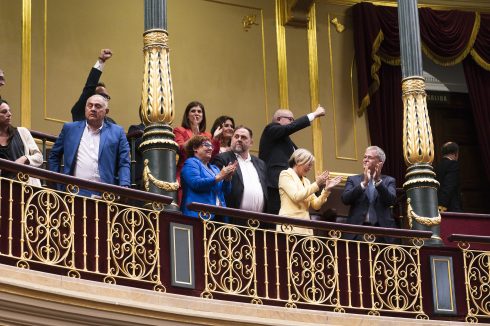SPAIN’S Congress voted on Thursday to finally approve a controversial amnesty law for hundreds of Catalan separatists involved in an illegal bid for independence in 2017.
The amnesty could benefit former Catalunya president, Carles Puigdemont, who fled to Belgium following the illegal vote and will now not be prosecuted over the matter.
It will also help out hundreds more, including former Catalan government officials who took part in the secession attempt or protests, as well as some police officers involved in a crackdown on the illegal independence referendum.
READ MORE:
- Crucial victory for Pedro Sanchez as controversial amnesty law for Catalan separatists gets parliamentary backing in Spain
- Spain’s ruling Socialists reach controversial deal with Catalan separatist parties over amnesty law
- Spain’s opposition Partido Popular in chaos after leader Alberto Nuñez Feijoo makes ‘off the record’ U-turn on Catalan amnesty

The amnesty law was passed by parliamentarians with a five vote margin of 177 to 172.
It was opposed by the conservative Partido Popular and the far-right Vox party.
The measure was initially approved by the lower house of Congress in March, but the Senate, where right-wing parties hold a majority, blocked it earlier this month.
The constitution allows for the lower house to have the final say, which it duly did on Thursday.
Tensions ran high with an opposition member shouting ‘traitor’ at Prime Minister, Pedro Sanchez, when he voted in favour of the law.
The debate before the vote saw emotions run high including a Vox representative interrupting PSOE socialist member, Artemi Rallo, several times as he was branded ‘corrupt’ and a ‘sell out’.
“Europe, Spain and Catalunya have said ‘yes’ to the amnesty, even if you don’t like hearing it,” Rallo responded.
He was referring to the endorsement of the amnesty law by the Council of Europe, a non-European Union institution that promotes human rights.
The amnesty law is likely to face legal challenges and will be reviewed by higher courts.
It also must be applied by courts on a case-by-case basis.
There are experts who question its constitutionality since they say it would create inequality between Spanish citizens by favouring some over others.
Click here to read more Politics News from The Olive Press.








